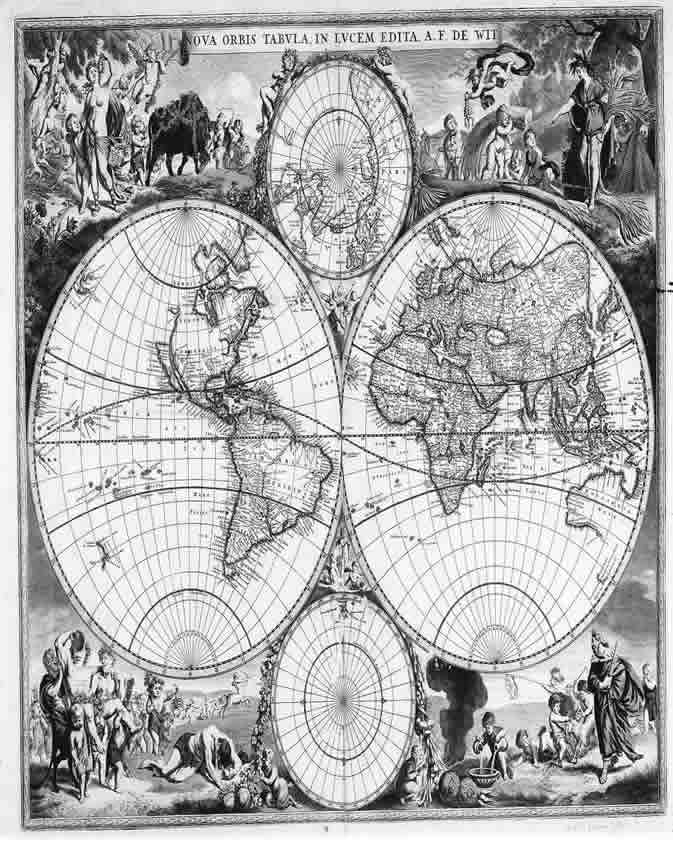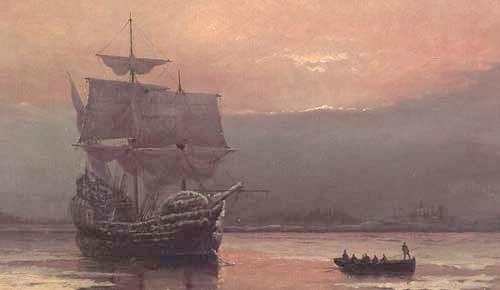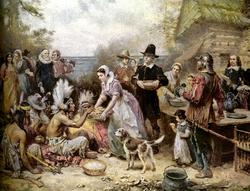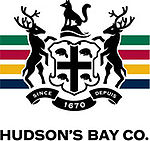 The New World
The New World Overview: Explorations and discoveries abound in the New World. The lives of Native Americans are changed forever. In order to escape religious persecution, the Pilgrims leave the Old World for the New. Smallpox is introduced by Europeans into the New World reducing the native population from 10,000 to 1,000 in New England, then spreads to Virginia and kills the chief of the Powhatans.
Overview: Explorations and discoveries abound in the New World. The lives of Native Americans are changed forever. In order to escape religious persecution, the Pilgrims leave the Old World for the New. Smallpox is introduced by Europeans into the New World reducing the native population from 10,000 to 1,000 in New England, then spreads to Virginia and kills the chief of the Powhatans.
Technology: German astronomer Johannes Kepler, following in the steps of Tycho Brahe, establishes that planets move in an inconstant rate of motion along elliptical paths. Italian astronomer Galileo Galilei is arrested by the Catholic Church on charges of heresy for his work in support of a sun-centered Copernican solar system and later threatened with torture. England's Sir Francis Bacon proposes that scientific reasoning come from inductive rather than the classical method of deductive reasoning, leading to the formation of the fundamental principles of the scientific method. English doctor William Harvey, in his Essay on the Motion of the Heart and the Blood, proposes that the heart is a muscle that pumps blood throughout the body. Nitric acid, an essential component for explosives, is invented by Johann Glauber.
Condoms made of sheep's gut are referred to for the first time in the Parisian publication L'ecole Des Filles and will gain some popularity in the upper class to protect against rampant venereal disease. Birth control remains virtually unknown. Clockmaking is revolutionized when Dutch mathematician Christian Huygens introduces the use of the pendulum. The scientific revolution gains momentum as Jan Swammerdam, a Dutch naturalist, provides the first known description of red blood cells. "Father of Chemistry" Robert Boyle usurps the classical theory that there are only four basic elements--wind, water, earth and fire.
The cuckoo clock is invented in Germany when techniques are developed to make clocks entirely from wood. English mathematician Isaac Newton becomes the "father of calculus" when he discovers rules for using algebraic figures that have a rate of change; he also defines the law of gravity, which states that gravity has a direct relationship to mass and distance. The famous observatory in Greenwich, England, is founded for astronomical research; the observatory also establishes a standard time to help determine longitude. German mathematician Gottfried Wilhelm invents a calculating machine that can add, subtract, and multiply. Champagne is developed in France when Monk Pierre Perignon pioneers the technique of capturing effervescence with the help of strong English glass.
 1600s - Henry Hudson explores searches in vain for a northern passage through the Barents Sea. The Black Death kills more than 33,000 people in London. England's Queen Elizabeth passes an "Act for the Relief of the Poor," which helps to find employment and necessaries for the needy. Animosity between French colonists and the Five Nations Iroquois of the New World begins with an attack by Samuel de Champlain. A plot to blow up the English Parliament is uncovered when its cellars are discovered to be filled with gunpowder; the Catholic perpetrators are hanged by Protestant powers. (See, there were terrorist even back then.)
1600s - Henry Hudson explores searches in vain for a northern passage through the Barents Sea. The Black Death kills more than 33,000 people in London. England's Queen Elizabeth passes an "Act for the Relief of the Poor," which helps to find employment and necessaries for the needy. Animosity between French colonists and the Five Nations Iroquois of the New World begins with an attack by Samuel de Champlain. A plot to blow up the English Parliament is uncovered when its cellars are discovered to be filled with gunpowder; the Catholic perpetrators are hanged by Protestant powers. (See, there were terrorist even back then.)
1607 - Establishment of Jamestown , [Virginia]
1610s - The expulsion of the Moors from Spain weakens the economic and cultural life of the country. The arrival of settlers and fresh supplies narrowly prevents the Jamestown colonists from abandoning the colony after devastating losses from disease and hunger. Henry Hudson disappears forever after his crew mutinies and strands him at James Bay. The King James version of the Bible is published in England after seven years of work, establishing an authoritative vernacular version of the text. Tobacco becomes an essential trade commodity in Virginia, ensuring the economic survival of the early colonists. Pocahontas, daughter of the famed Indian chief of the Powhatans, marries John Rolfe after being held for ransom by the English colonists. Captain John Smith of the Virginia colony explores the northeastern coast and names the town of Plymouth, Massachusetts.
1620 - Mayflower lands at Plymouth, [Massachusetts]
 1621 - First Thanksgiving at Plymouth
1621 - First Thanksgiving at Plymouth
1626 - Dutch colonists purchase Manhattan Island from the Wappinger Confederacy for 60 guilders, which is equivalent to several thousand dollars in today's currency.
1630-43: over 2000 English Puritans immigrate to Massachusetts Bay Colony
1630s - Bubonic Plague kills close to 500,000 people. Hartford, Connecticut, is founded in North America by the Dutch. Harvard College in Massachusetts has its origins in the founding of a seminary. Honeybees are brought by colonists to North America, where they begin to breed naturally. The mutual ongoing violence between the colonists and Native Americans leads to the death of 600 members of the Massachusetts Bay Colony in a raid by the Pequot tribe.
1640s - The last emperor of China's Ming dynasty commits suicide when Beijing falls to rebel forces, and the rule of the Ch'ing dynasty begins. Violence between the natives of North America and the Dutch settlers continues when New Amsterdam's governor calls for a massacre of Wappinger Indians. The labor demand on the sugar plantations of Brazil leads to the importation of 10,000 slaves a year. The Quaker sect originates in Leicestershire, England,  under the leadership of George Fox, who is heavily influenced by Anabaptist theology. The English civil war ends when Charles I surrenders to Oliver Cromwell and the Roundheads. Charles' decapitation transforms England into a republic headed by Lord Protector Oliver Cromwell. India's Taj Mahal is completed by order of the Mogul emperor Shah Jahan and becomes one of the seven manmade wonders of the world.
under the leadership of George Fox, who is heavily influenced by Anabaptist theology. The English civil war ends when Charles I surrenders to Oliver Cromwell and the Roundheads. Charles' decapitation transforms England into a republic headed by Lord Protector Oliver Cromwell. India's Taj Mahal is completed by order of the Mogul emperor Shah Jahan and becomes one of the seven manmade wonders of the world.
1650s - After persecuting Christians and solidifying the Tokugawa shogunate, infamous Japanese ruler Lemitsu dies and is succeeded by his son, Letsuna. English trade benefits from the Navigation Act, which forbids the importation of goods into England and her colonies by non-English vessels. Dutch settlement in South Africa begins when Jan van Riebeck founds Cape Town. Manhattan's Wall Street will get its name from the defensive structure built by Dutch settlers to defend against English aggression. Maria Theresa of Spain is engaged to marry the French king, Louis XIV; Spain slides further away from its former glory when it grants territories to France in the Treaty of Pyrenees. The seeds of religious tolerance in the New World appear in a document written to New Amsterdam's governor Peter Stuyvesant regarding Quaker colonists. England goes to war for three years with Spain in order to assume control of Jamaica.
1660s - Civil war in England ends when Charles II is welcomed back from France and instated as king; his arrival marks the beginning of the English Restoration. Two-thirds of London is evacuated to avoid the Black Plague, but nearly 70,000 people die of the disease. To maintain a trade monopoly on her colonies, the English passes the Second Navigation Act, prohibiting colonists from directly trading with any European nation. Brooklyn, New York, is founded under the Dutch name "Bruecklelen." Conflict over possession of the Mediterranean territories continues when Crete is overtaken by the Ottoman Turks.
 1670s - Hudson's Bay Company chartered. Rice is introduced to South Carolina from Madagascar but will not be a trading resource for years, as people lack the information for its cultivation. Puritans found Charleston, named for King Charles II of English, in the Carolina colony. The English tradition of wearing wigs in court is imported from France by King Charles II. Nearly 80,000 people die of the Black Plague in Vienna. In London, the Habeas Corpus Act ensures that no prisoner shall be jailed for the same offense twice. The strictness of English trade laws become a matter of contention in the colonies, leading to protests such as the Carolina colony's Culpeper Rebellion.
1670s - Hudson's Bay Company chartered. Rice is introduced to South Carolina from Madagascar but will not be a trading resource for years, as people lack the information for its cultivation. Puritans found Charleston, named for King Charles II of English, in the Carolina colony. The English tradition of wearing wigs in court is imported from France by King Charles II. Nearly 80,000 people die of the Black Plague in Vienna. In London, the Habeas Corpus Act ensures that no prisoner shall be jailed for the same offense twice. The strictness of English trade laws become a matter of contention in the colonies, leading to protests such as the Carolina colony's Culpeper Rebellion.
1680s - The European economy enters a period of change and turmoil that lasts almost half a century. Europeans on the island of Mauritius hunt the dodo bird to extinction. The Mississippi Valley is declared the property of the French king, Louis XIV, by Robert Cavelier, sieur de La Salle. Taiwan is conquered by the Chinese.
1682 - William Penn receives a charter for land on which he will found Pennsylvania. The French establish the colony of La Louisiane encompassing the area of the states of: Louisiana, Mississippi, Arkansas, Oklahoma, Missouri, Kansas, Nebraska, Iowa, Illinois, Indiana, Michigan, Wisconsin, Minnesota, North Dakota and South Dakota.
1690s - The Bank of London, which will become England's monetary dynamo, is chartered after loaning funds to the government. The infamous triangular slave trade route from North America to the Caribbean to Africa develops as the English opens up the slave trade to British merchants. The first legitimate stock exchange is founded in London, England.
1692 - (May) Salem witchcraft trials begin. From June-September 22, 20 people are executed.
1000's | 1100's | 1200's | 1300's | 1400's | 1500's | 1600's | 1700's | 1800's | 1900's | 2000's
About the Project | The Third Millennium Prophecies | Bibliography | Lessons Learned